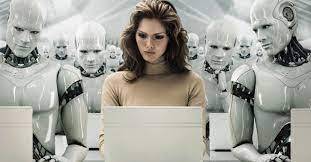Artificial intelligence is already everywhere. From Amazon product suggestions to Google auto-complete, AI has invaded nearly every aspect of our lives. The trouble is that AI just isn’t very good. Have you ever had a meaningful conversation with Siri or Alexa or Cortana? Of course not. But that doesn’t mean it always will be this way. Though it hasn’t quite lived up to our expectations, AI is definitely improving. In a utopian version of an AI-dominated future, humans are assisted by friendly, all-knowing butlers that cater to our every need. In the dystopian version, robots assert their independence and declare a Terminator-style apocalypse on humanity. But how realistic are these scenarios? Will AI ever actually achieve true general intelligence? Will AI steal all of our jobs? Can AI ever become conscious? Could AI have free will? Nobody knows, but a good place to start thinking about these issues is here.
VIEWPOINTS
“It’s already becoming painfully clear that even research in transformers is yielding diminishing returns.”
“Transformers are getting larger and more power hungry. A recent transformer developed by Chinese search engine giant Baidu has several billion parameters. It takes an enormous amount of data to effectively train. Yet, it has so far proved unable to grasp the nuances of human common sense. Even deep learning pioneers seem to think that new fundamental research may be needed before today’s neural networks are able to make such a leap. Depending on how successful this new line of research is, there’s no telling whether machine common sense is five years away, or 50.”
-Mayank Kejriwal
“I think a lot of people dismiss this kind of talk of super intelligence as science fiction…”
“…because we’re stuck in this sort of carbon chauvinism idea that intelligence can only exist in biological organisms made of cells and carbon atoms. As a physicist, from my perspective intelligence is just a kind of information processing preformed by elementary particles moving around according to the laws of physics. And there’s absolutely no law in physics that says you can’t do that in ways that are much more intelligent than humans.”
-Max Tegmark (Physicist)
“The dire view, which is more the traditional view, is that human minds have a lot of complexity,…”
“…that you need to build a lot of functionality into it, like in Minsky’s society of mind, to get to all the tricks that people are up to. And if that is the case then it might take a very long time until we have re-created all these different functional mechanisms. But I don’t think that it’s going to be so dire, because our genome is very short and most of that codes for a single cell. Very little of it codes for the brain. And I think a cell is much more complicated than a brain.”
-Joscha Bach (Harvard Program for Evolutionary Dynamics)




